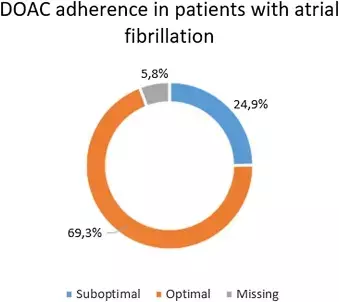- Home
- Medical news & Guidelines
- Anesthesiology
- Cardiology and CTVS
- Critical Care
- Dentistry
- Dermatology
- Diabetes and Endocrinology
- ENT
- Gastroenterology
- Medicine
- Nephrology
- Neurology
- Obstretics-Gynaecology
- Oncology
- Ophthalmology
- Orthopaedics
- Pediatrics-Neonatology
- Psychiatry
- Pulmonology
- Radiology
- Surgery
- Urology
- Laboratory Medicine
- Diet
- Nursing
- Paramedical
- Physiotherapy
- Health news
- Fact Check
- Bone Health Fact Check
- Brain Health Fact Check
- Cancer Related Fact Check
- Child Care Fact Check
- Dental and oral health fact check
- Diabetes and metabolic health fact check
- Diet and Nutrition Fact Check
- Eye and ENT Care Fact Check
- Fitness fact check
- Gut health fact check
- Heart health fact check
- Kidney health fact check
- Medical education fact check
- Men's health fact check
- Respiratory fact check
- Skin and hair care fact check
- Vaccine and Immunization fact check
- Women's health fact check
- AYUSH
- State News
- Andaman and Nicobar Islands
- Andhra Pradesh
- Arunachal Pradesh
- Assam
- Bihar
- Chandigarh
- Chattisgarh
- Dadra and Nagar Haveli
- Daman and Diu
- Delhi
- Goa
- Gujarat
- Haryana
- Himachal Pradesh
- Jammu & Kashmir
- Jharkhand
- Karnataka
- Kerala
- Ladakh
- Lakshadweep
- Madhya Pradesh
- Maharashtra
- Manipur
- Meghalaya
- Mizoram
- Nagaland
- Odisha
- Puducherry
- Punjab
- Rajasthan
- Sikkim
- Tamil Nadu
- Telangana
- Tripura
- Uttar Pradesh
- Uttrakhand
- West Bengal
- Medical Education
- Industry
Depression may lower adherence to DOACs among AF patients

Depression may lower adherence to DOACs among AF patients suggests a new study published in the Journal of the American Heart Association.
Adherence to oral anticoagulation is essential for stroke prevention in atrial fibrillation (AF). Depression has been associated with decreased adherence to medications in multiple disease states and in AF is further associated with increased risk of stroke. We hypothesized that individuals with depression and AF have decreased adherence to anticoagulation than those without depression.
They used administrative claims data to identify individuals with AF initiating anticoagulation with direct‐acting oral anticoagulants (DOACs) or warfarin between 2013 and 2019. We quantified adherence using proportion of days covered, categorized as limited (proportion of days covered, <80%), adequate (proportion of days covered, ≥80% to <90%), or optimal (proportion of days covered, ≥90%). We related depression to 12‐month adherence to anticoagulation in logistic regression models, adjusting for demographics, medical and psychiatric comorbidities, household income, educational attainment, and insurance type. As a secondary analysis, we determined the association of depression to adherence for each DOAC agent. We identified 101 041 individuals (aged 74.5±8.9 years; 50.6% women; 29.5% race or ethnicity other than White, including Asian or Black race and Hispanic ethnicity) who initiated either DOACs or warfarin. The odds of adequate adherence to DOACs was 11% (95% CI, 0.85–0.93), and the odds of optimal adherence was 12% (95% CI, 0.83–0.91) less in individuals with depression than those without. Depression was not associated with adherence to warfarin.
They identified an association between depression and decreased adherence to DOACs but not warfarin in individuals with AF. Recognizing depression in AF may guide interventions to improve anticoagulation adherence and reduce stroke risk.
Reference:
Association of Depression and Adherence to Oral Anticoagulation in Patients With Atrial Fibrillation. Matthew E. Lapa, Gretchen M. Swabe and Jared W. Magnani
Originally published20 Nov 2023https://doi.org/10.1161/JAHA.123.031281Journal of the American Heart Association. 2023;12:e031281
Keywords:
Depression, may, lower, adherence, DOACs, among, AF, patients, Journal of the American Heart Association, Matthew E. Lapa, Gretchen M. Swabe and Jared W. Magnani
Dr. Shravani Dali has completed her BDS from Pravara institute of medical sciences, loni. Following which she extensively worked in the healthcare sector for 2+ years. She has been actively involved in writing blogs in field of health and wellness. Currently she is pursuing her Masters of public health-health administration from Tata institute of social sciences. She can be contacted at editorial@medicaldialogues.in.
Dr Kamal Kant Kohli-MBBS, DTCD- a chest specialist with more than 30 years of practice and a flair for writing clinical articles, Dr Kamal Kant Kohli joined Medical Dialogues as a Chief Editor of Medical News. Besides writing articles, as an editor, he proofreads and verifies all the medical content published on Medical Dialogues including those coming from journals, studies,medical conferences,guidelines etc. Email: drkohli@medicaldialogues.in. Contact no. 011-43720751


